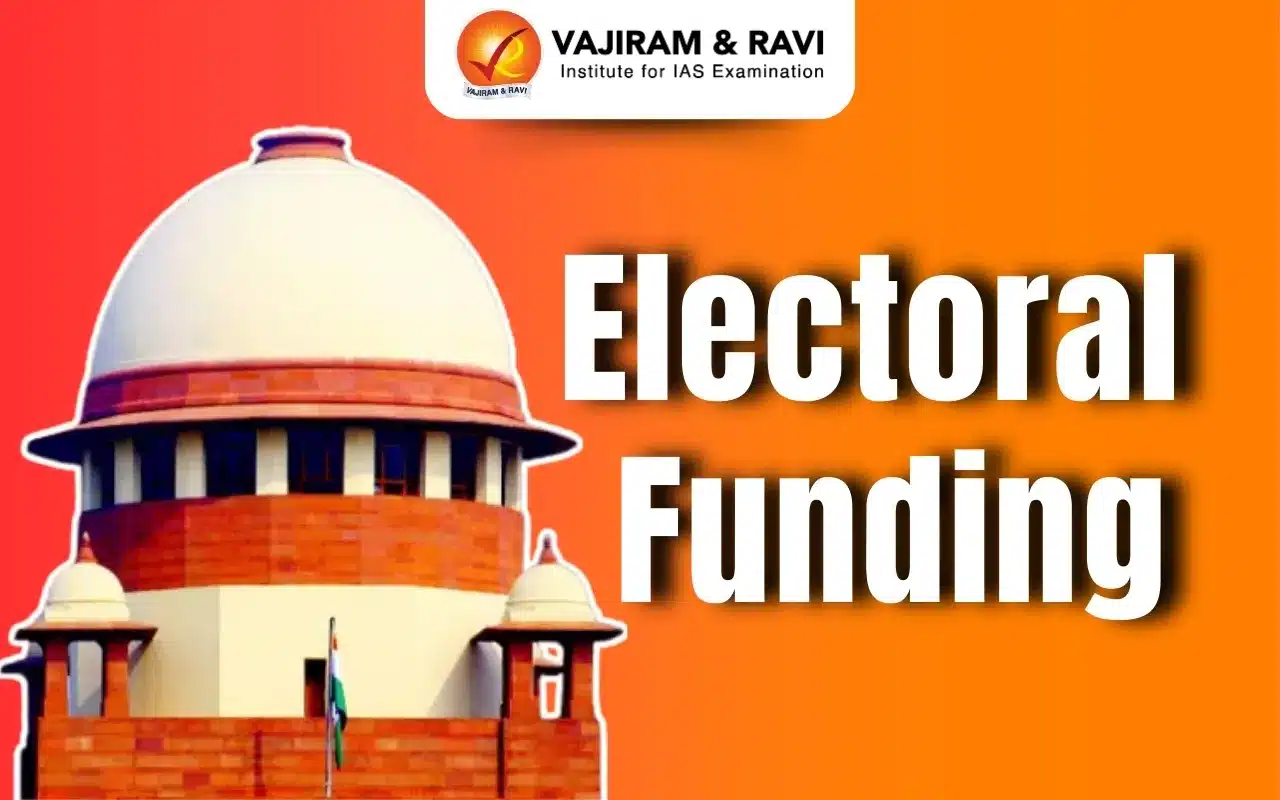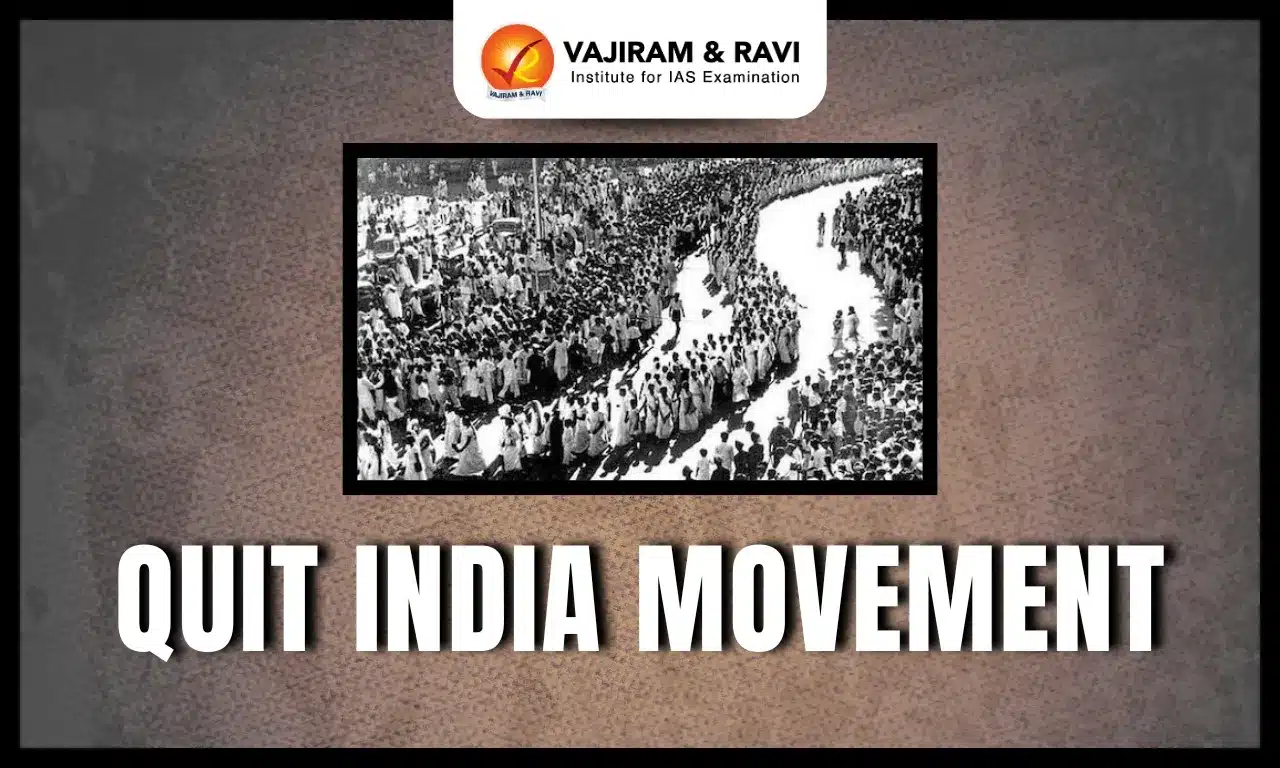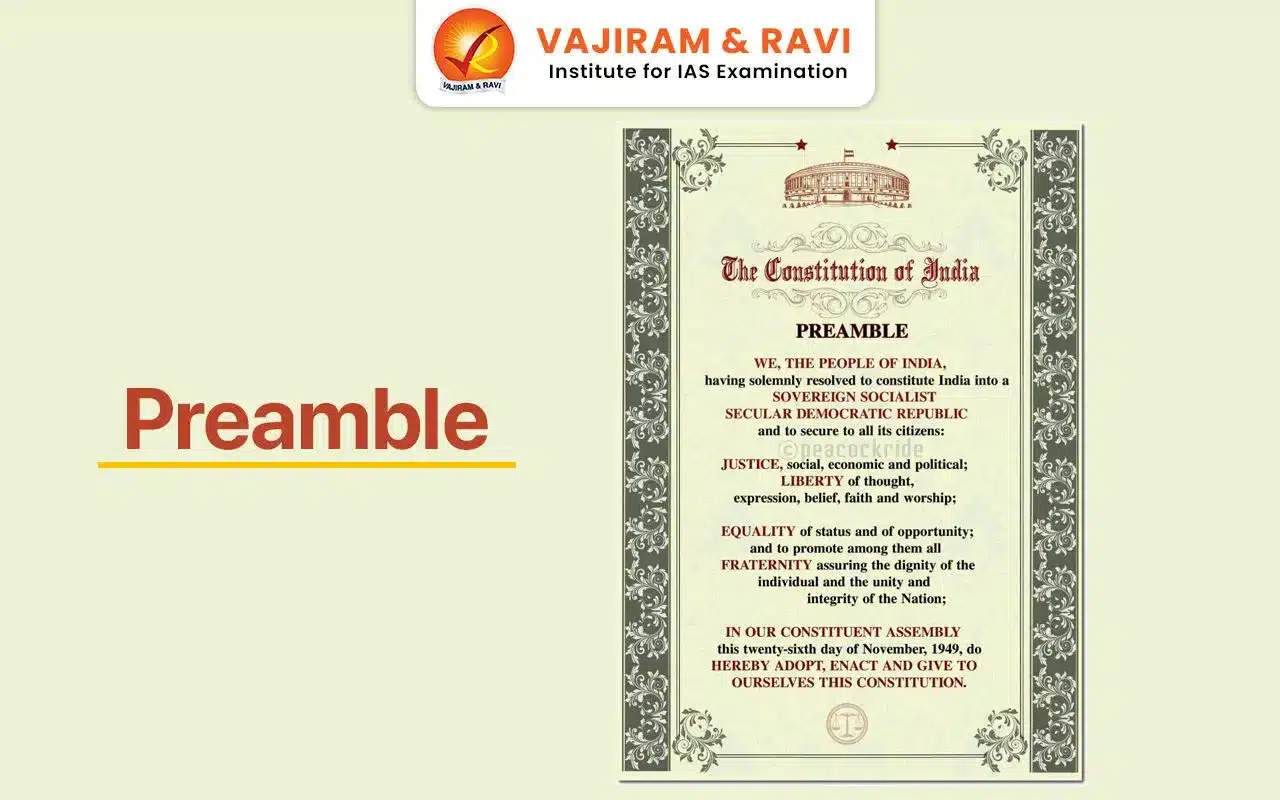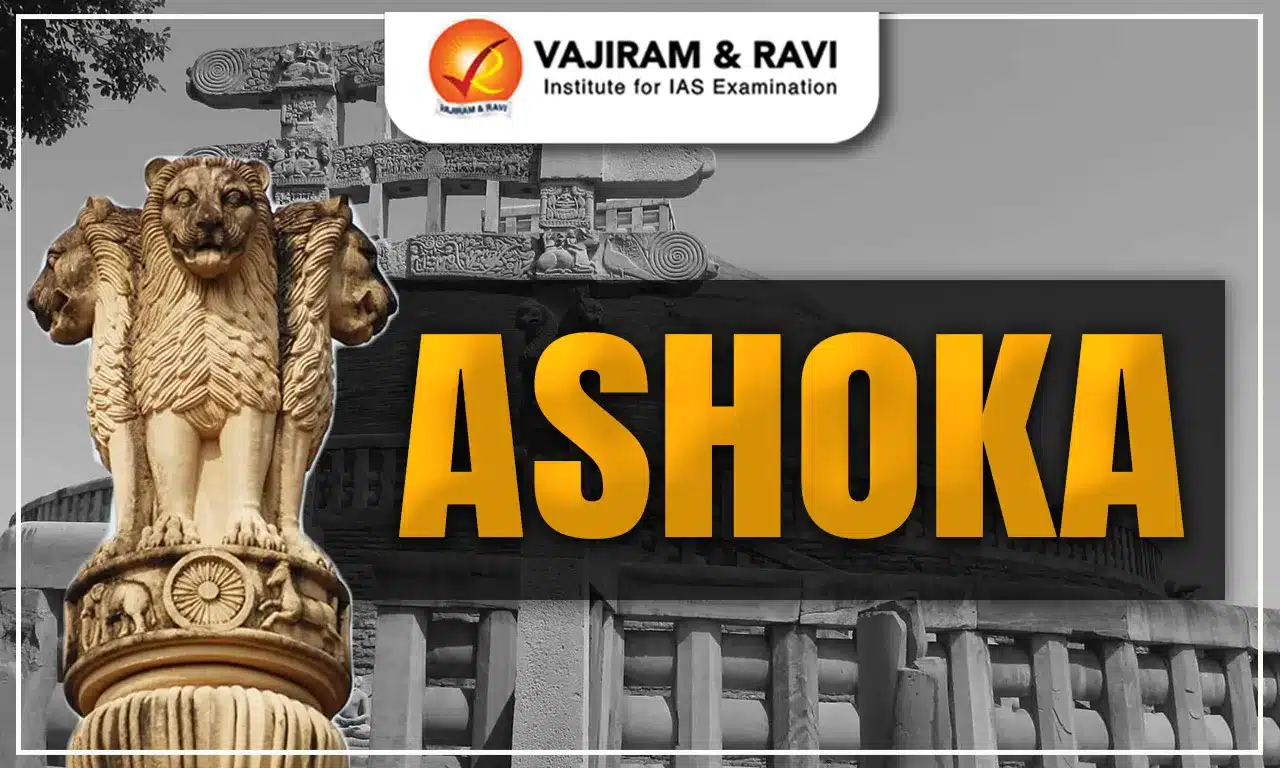Electoral funding refers to the financial resources raised and spent by political parties and candidates during election campaigns. In India, it is crucial for conducting elections, managing campaign costs, and fostering democratic participation. However, concerns about transparency and accountability persist, particularly with corporate donations and electoral bonds. Mechanisms such as individual donations, state funding, corporate contributions, and electoral trusts regulate funding.
Proposed reforms include state funding, enhanced transparency in electoral bonds, and bringing political parties under the RTI Act to ensure accountability.
What is Electoral Funding?
Electoral funding refers to the funds raised and expended by political parties and candidates during election campaigns. In India, electoral funding has been a contentious issue for a long time, with concerns about transparency, accountability, and the influence of money in politics. Here are some of the key reasons why electoral funding is necessary in India:
- Conducting Elections: Elections in India are the largest democratic exercise in the world. With a population of over 1.3 billion, the country requires a significant amount of funds to conduct elections in a free and fair manner.
- Cost of Campaigning: Election campaigns in India have become increasingly expensive over the years, with political parties and candidates spending large amounts of money on advertising, rallies, and other activities.
- Democratic Participation: Adequate electoral funding can encourage greater democratic participation by allowing more individuals to run for office and compete in elections. This can lead to a more diverse range of candidates and ideas, which can enrich the democratic process.
- Transparency and Accountability: A regulated electoral funding system ensures transparency by mandating disclosure of significant donations, enabling voters to identify funding sources and potential policy influences.
- Reduction of Corruption: Formalized funding with oversight reduces corruption by minimizing dependence on private donations that could foster quid pro quo arrangements.
Electoral Funding Mechanisms
Electoral funding in India involves financial contributions from individuals, organizations, or political parties to support election campaigns. Key mechanisms include individual donations, state funding, corporate contributions, electoral trusts, and electoral bonds. While regulated by laws like the Representation of the People Act, 1951, and the Income Tax Act, 1961, these mechanisms often raise concerns about transparency and accountability.
Recent debates, including the Supreme Court’s ruling striking down the electoral bonds scheme, highlight ongoing challenges in balancing transparency with donor anonymity.
Individual Donations
Individual donations play a significant role in India's electoral funding, supporting political parties and candidates. The Representation of the People Act, 1951 and the Income Tax Act, 1961 regulate these donations.
- Representation of the People Act, 1951 (RPA): Section 29B allows political parties to accept voluntary contributions, excluding government companies. Section 29C mandates reporting donations over ₹20,000 to the Election Commission for transparency.
- Income Tax Act, 1961: Section 13A caps anonymous cash donations at ₹2,000, while Section 80GGB provides tax deductions for donations to registered parties, encouraging financial contributions.
- Parties must issue receipts for all donations for accountability.
- Data and trends: In 2022-23, individual donations accounted for 25% of political parties income, but significant portions from unknown sources, raising transparency concerns.
- Donations above ₹2,000 must be made via traceable methods like cheques or digital transactions.
State Funding
State Funding (Public Funding) of elections in India provides financial support to political parties and candidates to reduce reliance on private donations and minimize the influence of vested interests. Types of State Funding: It is of two types:
- Direct Funding: The government offers monetary assistance for election campaigns, though it is rarely implemented due to concerns about misuse.
- Indirect Funding: This includes free media access, public spaces for rallies, subsidized transport, and tax exemptions for political parties under Section 13A of the Income Tax Act.
Status of State Funding in India: Several government reports have evaluated the idea of state funding for elections in India, each providing nuanced recommendations:
- Indrajit Gupta Committee (1998): Endorsed state funding to ensure fairness, recommending funds only for recognized national and state parties, with in-kind support due to economic constraints.
- Law Commission Report (1999): Recommended total state funding, conditional on banning other funding sources, and stressed the need for a regulatory framework for internal democracy and financial accountability.
- National Commission to Review the Working of the Constitution (2001): Opposed state funding but agreed with the need for a regulatory framework for political parties.
- Second Administrative Reforms Commission ("Ethics in Governance", 2008): Advocated for partial state funding to reduce illicit election spending and promote funding reforms.
Corporate Funding
Corporate funding is a significant source of financial support for political parties and candidates in India, facilitated by legal provisions and regulatory changes.
- Companies Act, 2013: Section 182 permits Indian companies to contribute to political parties, with board approval and non-cash donations. Contributions must be disclosed in financial statements.
- The amendment in 2017 removed the 7.5% cap on corporate donations, expanding funding potential.
- Companies must disclose total contributions but no longer specify recipient parties, raising concerns over transparency.
- Representation of the People Act, 1951 (RPA): Requires political parties to be registered with the Election Commission for corporations to donate.
- Foreign Contribution (Regulation) Act, 2010 (FCRA): Allows foreign companies with majority Indian ownership to contribute, increasing concerns about foreign influence.
- Transparency and Accountability: Growing scrutiny over transparency, especially after the removal of party-specific disclosure requirements. Donations now occur via bank transfers or electoral trusts to ensure legal compliance.
Electoral Trusts
Electoral trusts, established under the Electoral Trusts Scheme, 2013, facilitate transparent political funding by allowing individuals and corporations to donate anonymously to political parties.
- Formation and Registration: Trusts are registered with the Central Board of Direct Taxes (CBDT) and serve as intermediaries for pooling and distributing funds to political parties.
- Contribution Process: Donors contribute to a trust, which then allocates funds to parties. Donors contributing over ₹20,000 are disclosed, but the amounts given to individual parties remain undisclosed.
- Reporting: Trusts submit annual financial reports to the Election Commission of India (ECI), while political parties must issue detailed receipts for donations.
- Largest share: Bharti-backed Prudent Electoral Trust has emerged as a leading trust, contributing a substantial share of donations through this mechanism.
Electoral Bonds
Electoral bonds, introduced in 2018 by the Government of India, were designed to streamline donations to political parties while maintaining donor anonymity. They have been central to debates on electoral transparency and accountability.
- Bearer Instrument: Electoral bonds operate like promissory notes, with no record of the purchaser's identity on the bond itself. This ensures donor anonymity, protecting contributors from potential backlash or undue influence.
- Eligibility: Indian citizens, including individuals, businesses, and corporate entities, can purchase electoral bonds, provided they use a KYC-compliant bank account. This requirement ensures accountability during the purchasing process.
- Denominations: Bonds are available in values of ₹1,000, ₹10,000, ₹1 lakh, ₹10 lakh, and ₹1 crore, offering flexibility for small and large donors alike.
- Validity Period: Bonds must be encashed within 15 days of purchase, ensuring they are used promptly for electoral purposes. Expired bonds become null and void.
- Eligible Political Parties: Only political parties registered under Section 29A of the Representation of the People Act, 1951, and that secure at least 1% of the votes in the most recent general election are eligible to receive funds through electoral bonds.
- Purchase Windows: Bonds are available for purchase during specific 10-day windows in January, April, July, and October. An additional 30-day window is opened in election years to accommodate increased funding needs.
- Purchase Process: Bonds are sold exclusively through designated branches of the State Bank of India (SBI). Payments must be made via cheque, demand draft, or digital transactions, ensuring a clear audit trail.
- Donation Transfer: Once purchased, donors submit the bonds to the political party of their choice. The party redeems these bonds through its verified bank account.
- Anonymity and Reporting: While the donor's identity is concealed, the receiving political party must report the total funds raised through electoral bonds to the Election Commission of India (ECI) in its annual filings.
- Recent development: On February 15, 2024, the Supreme Court of India struck down the electoral bond scheme, deeming it unconstitutional. The court held that the scheme violated citizens' fundamental right to information by obscuring the identity of donors.

Electoral Funding Global Examples
Electoral funding is a complex and contentious issue in many countries, and global best practices can vary depending on the specific context. However, here are some measures that have been followed by various countries for electoral funding:
- United States: The Tillman Act of 1907 made it illegal for corporations and national banks to contribute financially to candidates running for public office.
- United Kingdom: Political Parties Elections and Referendums Act, 2000 has banned donations from companies without shareholders' prior approval.
- France: France has introduced state funding, subsidies, strict disclosure legislations, robust reporting of the donations to political parties by the media, and a ban on corporate donations and business houses.
- Germany: Reliance on state funding alienated the masses from the political parties who felt no need to connect with the majority of the population. In 1994, a Constitutional Court held that over-reliance on state funding was not an effective tool.
- New Zealand: New Zealand's Mixed Model blends public funding with capped private donations, ensuring fairness and transparency by providing state support based on parliamentary representation while regulating and disclosing contributions.
Electoral Funding Challenges
Electoral funding in India has long been a topic of concern for many due to the possibility of corrupt practices and the influence of money on the democratic process. Some major challenges about electoral funding in India are:
- Anonymity of donations through Electoral Bonds: The introduction of electoral bonds in 2018 has made it easier for companies, wealthy individuals, and foreign entities to make anonymous donations to political parties.
- Ceiling on cash donations lowered: In the 2017 budget, the limit for anonymous cash donations by any individual to a political party has been lowered from ₹20,000 to ₹2,000. It has led to more anonymous donations.
- Cap on corporate contributions lifted: Removing the limit on corporate contributions up to 7.5 per cent of the net profit of a company’s past three financial years has increased the politico-corporate nexus and hence, the role of ‘Big Money’ can influence elections in favour of corporates.
- Foreign funding allowed: In the 2018 budget, the receiving of foreign funds by political parties has been allowed. Hence, the amendment to the Foreign Contribution (Regulation) Act 2010 has raised concerns about the potential influence of foreign entities on Indian politics.
- Influence of black money: Another major challenge in electoral funding in India is the influence of black money. Many political parties receive donations in the form of cash, which makes it difficult to trace the source of the funds.
- Role of corporate donations: Funding through corporate donations has been criticized for its potential to lead to quid pro quo arrangements. Many companies make donations to political parties with the expectation of receiving favourable policies in return.
- High election costs: The cost of running for office in India is high, which can put smaller parties at a disadvantage. The cost of campaigning can be a significant barrier to entry for new or smaller political parties, limiting the diversity of political representation.
- Political Party Dynamics: Political parties often rely heavily on major donors, prioritizing their interests over public welfare. This dependence fosters a nexus between politics and business, influencing policies that benefit corporate interests at the cost of societal needs.
Electoral Funding Reforms Suggested
Electoral funding reforms in India suggest state funding of elections, enhanced transparency in electoral bonds, and bringing political parties under the Right to Information (RTI) Act. The following are steps that could be taken to reform electoral funding in India:
- State Funding of Elections: In developed nations such as France, elections are financed through public funds. The idea of state funding of elections has been proposed by the 2nd Administrative Reforms Commission(ARC), Dinesh Goswami Committee (1990) and other entities.
- Transparency in Electoral Bonds: The effectiveness of the electoral bonds and transparency can be achieved by disclosing the identity of donors, imposing restrictions on the quantum of funds that can be donated, and requiring political parties to disclose their sources of funding.
- National Election Fund: Former Chief Election Commissioner T.S. Krishnamurthy has recommended exploring the possibility of a National Election Fund with the donation based on an agreed principle, such as the number of votes received.
- Political parties under RTI: Incorporating political parties within the purview of the Right to Information (RTI) Act would address the problems of utilizing black money and promoting crony capitalism, among others.
- Ensuring Accountability in Electoral Funding: Regular audits of political parties by independent agencies, coupled with transparent tracking of donations from source to campaign use, can enhance accountability and uncover irregularities in funding practices.
- Other Measures: Small donations, public subsidies, and membership fees, along with strict disclosure and reporting requirements, must be encouraged to decrease the role of "big money" in influencing elections.
Electoral Funding UPSC PYQs
Question 1: To enhance the quality of democracy in India the Election Commission of India has proposed electoral reforms in 2016. What are the suggested reforms and how far are they significant to make democracy successful? ( UPSC Mains 2017)
Last updated on January, 2026
→ Check out the latest UPSC Syllabus 2026 here.
→ Join Vajiram & Ravi’s Interview Guidance Programme for expert help to crack your final UPSC stage.
→ UPSC Mains Result 2025 is now out.
→ UPSC Notification 2026 Postponed for CSE & IFS which was scheduled to be released on 14 January 2026.
→ UPSC Calendar 2026 has been released.
→ UPSC Prelims 2026 will be conducted on 24th May, 2026 & UPSC Mains 2026 will be conducted on 21st August 2026.
→ The UPSC Selection Process is of 3 stages-Prelims, Mains and Interview.
→ Prepare effectively with Vajiram & Ravi’s UPSC Prelims Test Series 2026 featuring full-length mock tests, detailed solutions, and performance analysis.
→ Enroll in Vajiram & Ravi’s UPSC Mains Test Series 2026 for structured answer writing practice, expert evaluation, and exam-oriented feedback.
→ Join Vajiram & Ravi’s Best UPSC Mentorship Program for personalized guidance, strategy planning, and one-to-one support from experienced mentors.
→ UPSC Result 2024 is released with latest UPSC Marksheet 2024. Check Now!
→ UPSC Toppers List 2024 is released now. Shakti Dubey is UPSC AIR 1 2024 Topper.
→ Also check Best UPSC Coaching in India
Electoral Funding FAQs
Q1. What is electoral funding?+
Q2. What are the main sources of electoral funding in India?.+
Q3. What legal framework governs electoral funding in India?+
Q4. What challenges does electoral funding face in India?+
Q5. Are there limits on corporate donations?+
Tags: electoral funding quest

















